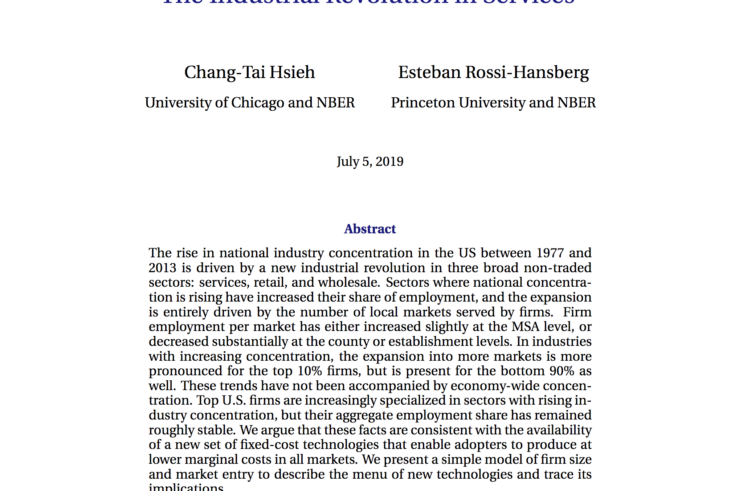Showing archive for: “Agriculture & Biotech”
Antitrust Populists Don’t Seem to Care About the Poor
Antitrust populists like Biden White House official Tim Wu and author Matt Stoller decry the political influence of large firms. But instead of advocating for policies that tackle this political influence directly, they seek reforms to antitrust enforcement that aim to limit the economic advantages of these firms, believing that will translate into political enfeeblement. ... Antitrust Populists Don’t Seem to Care About the Poor
More Evidence that the Patent System Promotes Dynamic Competition and Consumer Welfare
The patent system is too often caricatured as involving the grant of “monopolies” that may be used to delay entry and retard competition in key sectors of the economy. The accumulation of allegedly “poor-quality” patents into thickets and portfolios held by “patent trolls” is said by critics to spawn excessive royalty-licensing demands and threatened “holdups” ... More Evidence that the Patent System Promotes Dynamic Competition and Consumer Welfare
Old Ideas and the New New Deal
Over the past decade and a half, virtually every branch of the federal government has taken steps to weaken the patent system. As reflected in President Joe Biden’s July 2021 executive order, these restraints on patent enforcement are now being coupled with antitrust policies that, in large part, adopt a “big is bad” approach in ... Old Ideas and the New New Deal
Build Broadband Better: Focus on Competition, Not Competitors
President Joe Biden named his post-COVID-19 agenda “Build Back Better,” but his proposals to prioritize support for government-run broadband service “with less pressure to turn profits” and to “reduce Internet prices for all Americans” will slow broadband deployment and leave taxpayers with an enormous bill. Policymakers should pay particular heed to this danger, amid news ... Build Broadband Better: Focus on Competition, Not Competitors
Dynamic Merger Efficiencies: The Case of Pharmaceutical Markets
The recent launch of the international Multilateral Pharmaceutical Merger Task Force (MPMTF) is just the latest example of burgeoning cooperative efforts by leading competition agencies to promote convergence in antitrust enforcement. (See my recent paper on the globalization of antitrust, which assesses multinational cooperation and convergence initiatives in greater detail.) In what is a first, ... Dynamic Merger Efficiencies: The Case of Pharmaceutical Markets
Guiding a Post-Brexit UK Trade Liberalization Strategy
In the wake of its departure from the European Union, the United Kingdom will have the opportunity to enter into new free trade agreements (FTAs) with its international trading partners that lower existing tariff and non-tariff barriers. Achieving major welfare-enhancing reductions in trade restrictions will not be easy. Trade negotiations pose significant political sensitivities, such ... Guiding a Post-Brexit UK Trade Liberalization Strategy
Coronavirus treatments and vaccines: Patents … or a Prize?
Observers on TOTM and elsewhere have pointed out the importance of preserving patent rights as pharmaceutical and biotechnology companies pursue development of treatments for, and better vaccines against, Covid-19. As the benefits of these treatments could reach into the trillions of dollars (see here for a casual estimate and here for a more serious one), ... Coronavirus treatments and vaccines: Patents … or a Prize?
The Covidien/Newport Merger: Killer Acquisition or Just a Killer Story?
[TOTM: The following is part of a blog series by TOTM guests and authors on the law, economics, and policy of the ongoing COVID-19 pandemic. The entire series of posts is available here. This post is authored by Geoffrey A. Manne, (President, ICLE; Distinguished Fellow, Northwestern University Center on Law, Business, and Economics); and Dirk Auer, (Senior Fellow ... The Covidien/Newport Merger: Killer Acquisition or Just a Killer Story?
The Virulence of Free Trade
[TOTM: The following is part of a blog series by TOTM guests and authors on the law, economics, and policy of the ongoing COVID-19 pandemic. The entire series of posts is available here. This post is authored by Ramsi Woodcock, (Assistant Professor of Law, University of Kentucky; Assistant Professor of Management, Gatton College of Business ... The Virulence of Free Trade
What Can the Stock Market Tell Us About the T-Mobile/Sprint Merger?
On Monday evening, around 6:00 PM Eastern Standard Time, news leaked that the United States District Court for the Southern District of New York had decided to allow the T-Mobile/Sprint merger to go through, giving the companies a victory over a group of state attorneys general trying to block the deal. Thomas Philippon, a professor ... What Can the Stock Market Tell Us About the T-Mobile/Sprint Merger?
What if rising concentration were an indication of more competition, not less?
An oft-repeated claim of conferences, media, and left-wing think tanks is that lax antitrust enforcement has led to a substantial increase in concentration in the US economy of late, strangling the economy, harming workers, and saddling consumers with greater markups in the process. But what if rising concentration (and the current level of antitrust enforcement) ... What if rising concentration were an indication of more competition, not less?
The DOJ’s Approval of the CVS/Aetna Merger and Vertical Innovation by Incumbents
Last week, the DOJ cleared the merger of CVS Health and Aetna (conditional on Aetna’s divesting its Medicare Part D business), a merger that, as I previously noted at a House Judiciary hearing, “presents a creative effort by two of the most well-informed and successful industry participants to try something new to reform a troubled ... The DOJ’s Approval of the CVS/Aetna Merger and Vertical Innovation by Incumbents











